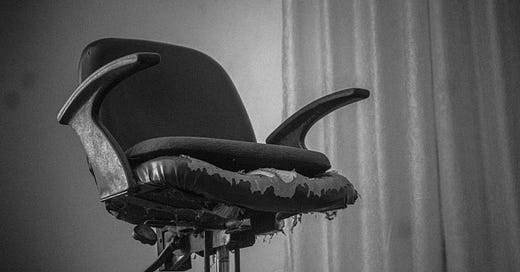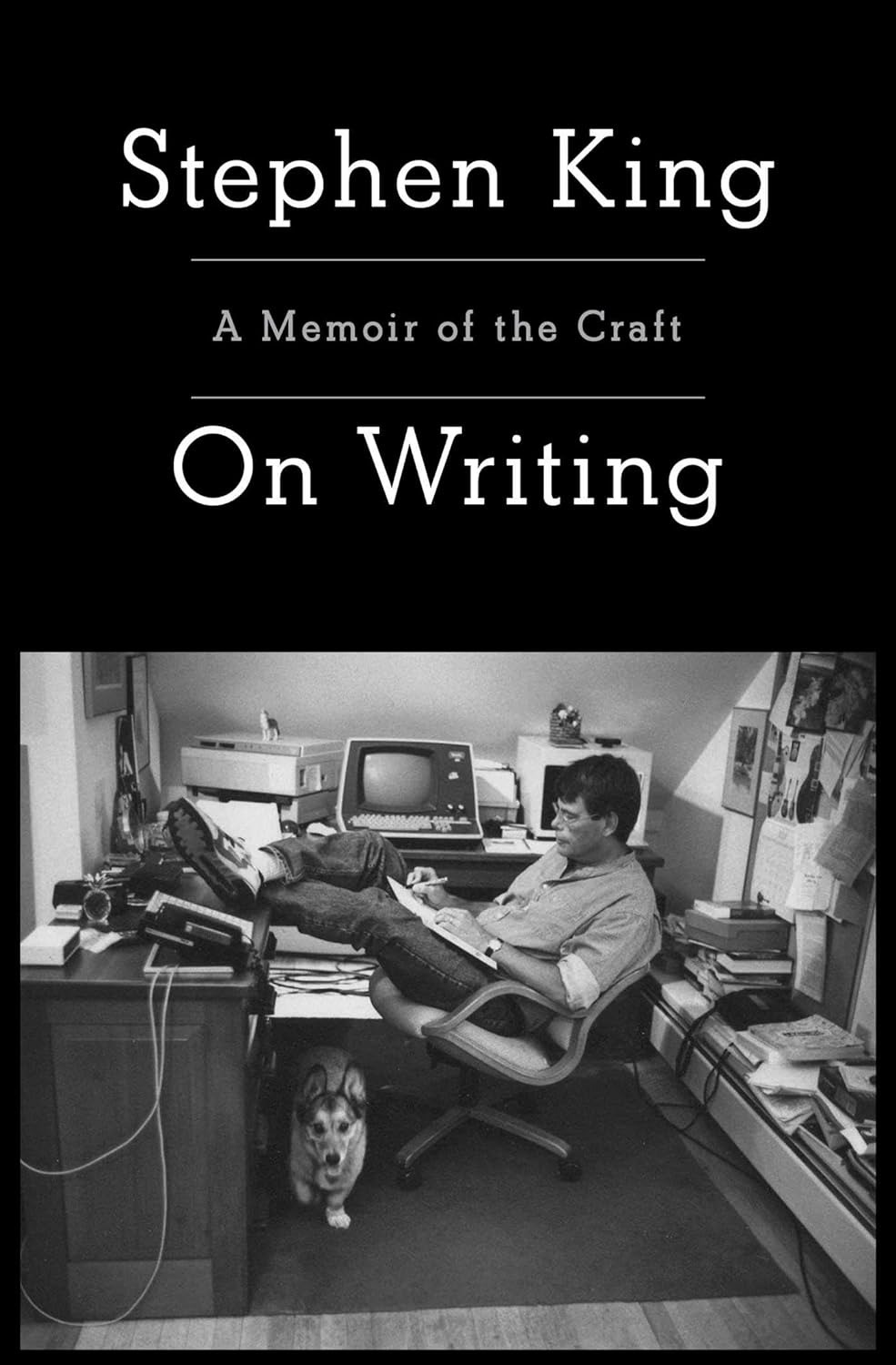This post is part of Art & Craft, my series that reviews books about writing books.
Despite being one of the most conventionally successful authors of all time, Stephen King does not frame On Writing as a definitive or even authoritative craft book (though the publisher tries). Through a book that is more memoir than manual, he shares a self-aware glimpse of his experiences and opinions as a writer.
Why I chose this book
I would probably need an excuse not to include this book. This title has a mandatory slot in every clickbait listicle on “books about how to write.” Someone gifted me a copy roughly a decade ago, and while I never made time to read it, I transferred it through more than one cross-country move. It just seems like one of those books every writer is supposed to have, the way everyone’s dad has a Tom Clancy tome you’ve never actually seen him read. But now it’s time to finally see what daddy horror has to say…
The highlights
Grasping at basic straws
The first section of the book is mainly autobiographical. King recounts his early career, including his brother’s homegrown newspaper, his own illicit hand-selling at school, and his adolescent magazine submissions and subsequent rejections. He gradually weaves in insights as he learned them, such as this revelation from John Gould, the local news editor who marked up one of his drafts to illustrate “When you write a story, you're telling yourself the story… When you rewrite your main job is taking out all the things that are not the story.” [page 57]
The second section offers suggestions for the writing process, a robust “tools in your toolbox” metaphor, and technical, line-level suggestions. Overall, I found the writing advice itself to be somewhat elementary. King decries the use of adverbs, provides examples of credible dialogue, and reminds us fledglings to pick up The Elements of Style and firm up our understanding of grammar. But he never pushes us to be more than anyone but ourselves. “Put your vocabulary on the top shelf of your toolbox,” he commands, “and don't make any conscious effort to improve it.” [Page 117]
A most relatable GOAT
The sales copy on the book calls On Writing a “master class” and “Immensely helpful and illuminating to any aspiring writer.” But King doesn’t pretend to harbor some secret to success. In reality, I think this book appeals most to superfans or anyone intrigued by King’s personal experiences, process, and philosophy. Though I did find the by-a-writer-for-writers perspective a refreshing break from other “answer to all your writing woes” craft books.
More than anyone, Stephen King knows what the trenches are like. Describing the perfect writing studio, he writes, “The space can be humble… and it really needs only one thing–a door which you are willing to shut.” [Page 155] This idea of a door is both metaphorical and literal. King revisits it to discuss the stages of the writing process, writing for yourself with the door closed, then opening that door to people you trust when you’re ready. He addresses how writing affects relationships, and the inverse, when relationships affect writing.
His recollections are interesting and validating. They reminded me of my most productive era, when I my sister bought me a mug that said “FUCK OFF, I’M WRITING” to signify she understood and accepted the reality of living with someone whose head was in a book. So if your housemates don’t get it–if you’re obsessed, frustrated, self-conscious, and distracted, between these pages, at least, you can be understood.
The cringe
It all started in his childhood…
If you’re not prepared for the memoir aspects of this book you may be taken off guard by the anecdotes of a young King having his eardrums drained and his babysitter farting in his face. I’m not sure if readers still ask writers, “Where do you get your ideas?” Perhaps, because of Steve’s thorough depiction of the genesis of his imagination, folks learned to stop asking.
Yeah, well, that’s just like, your opinion, man
While King might find me guilty of adverbial sin, I found his suggestions on how to conceptualize a story unproductive. He begins an integral chapter by claiming that stories consist of narration, description, and dialogue, then adds: “You may wonder where plot is in all this. The answer—my answer, anyway—is nowhere.” [page 163]
Expounding, he reveals that he’s a scenario writer. Inspired by a concept, he immediately begins writing, steered by intuition and imagination until he has a first draft. Then he revises. The cliche to describe this approach is “pantsing”, though I’ve heard some authors take offense at the implications of flying by the seat of their pants. Some prefer to describe themselves as gardeners or discovery writers. Of course, if this works for King (which, *waves hands at millions of books* obviously), more power. But he follows up to assert that plotted or otherwise pre-planned novels often feel contrived. Of course, together we could prove this to be false by crowdsourcing thousands of titles with crescendo climaxes and satisfying conclusions, all achieved through the author’s careful advance architecture. But a better argument against this take might be the countless reviews of The Stand, Under the Dome, and even It, all disheartened by their anti-climatic or otherwise disappointing endings (and those are all some long, long books).
But “Stephen King is not good at endings” is a tired meme.
In a quick tangent, I wonder how computers have affected our collective creative psyche when it comes to how and whether writers plot. One might assume that a detailed outline was crucial for authors working longhand or on a typewriter, since revision required more physical labor. But, conversely, the infinite editability of the word processor seems to have cultivated a generation of plotters. At least, I personally rarely meet authors who don’t start with some sort of outline. But maybe I’m just friends with fellow anxious millennials who want the story to be perfect before they begin to draft.
As Archetypists, remember the genre…
I’ll cite one more example of a take On Writing that gave me pause. When it comes to description, King says: “I can't remember many cases where I felt I had to describe what the people in a story of mine look like—I'd rather let the reader supply the faces, the builds, and the clothing as well… Description begins in the writer's imagination but should finish in the reader’s.” [page 174]
This advice might be most relevant to those of us writing mystery/thriller/suspense… maybe. But that’s only if you want to write like Stephen King. Readers in this genre might expect simpler prose and limited description. But why try to sound like anyone other than yourself? Why not be a descriptive, literary crime writer, if you want to be?
I’m furthermore wary of fixation on things like description, passive voice, and even the dreaded adverb. If you obsess over issues at the prose level, especially at the beginning of the process, you’re at risk of falling down rabbit holes which lead to shitty AI tools like Autocrit or the cursed Prosecraft (distractions, the lot of them).
Now, to the stars!
Star-ratings
How useful is this craft book?
2 out of 3 stars - ★☆☆
How humble is this craft book?
2 out of 3 stars - ★★★
How concise is this craft book?
3 out of 3 stars - ★★☆
I’ll close with this passage, which supports one of my own theories regarding a crucial ingredient to any writing journey: Intention. “You can approach the act of writing with nervousness, excitement, hopefulness or even despair–the sense that you can never completely put on the page what's in your mind and heart... Come to it any way but lightly. Let me say it again: you must not come lightly to the blank page.” [Page 106]
My personal hunch is that you will write best when you approach that blank page intentionally. That is, why specific goals at every step. At the sentence level, what information do you intend to include, or what feeling are you trying to evoke? At the scene level, how do you intend to advance the story? At the manuscript level, what experience or ideas do you intend to convey? You may never actually achieve the wildly creative and specific goals you set. But if you know yourself and your story, you can at least recognize whether you’re straying closer to or further from what you intend to achieve.





